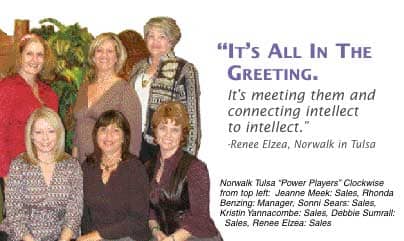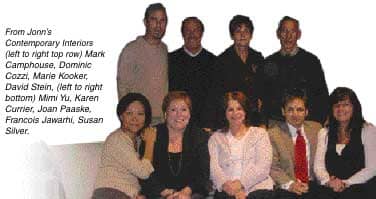Sales tips and training tools from successful sales associates.
Customers Into Clients By Cathy Finney.
The quarterback doesn’t stay in the locker room trying to score the much needed touchdown. Baseball players don’t stay “dug out” in the dugout trying to figure out when it’s their turn at bat. They know when it is their time to make that wood connect with the ball and hit it out of the park, and they’re ready.
Likewise, professional sales and design associates need to know when it is their turn to be “UP” and be ready to perform.
All of the sales associates (power players) interviewed for this article were asked to speak about their sales success strategies.
One underlying aspect of selling they all spoke of is the importance of connecting quickly with customers. In every aspect of life, perception is reality. Salespeople only get one shot at connecting with “Ethel” by making the best possible first impression.
THE PLAYERS’ APPROACH
Renee Elzea from Norwalk in Tulsa, Oklahoma told us, “It’s all in the greeting. It’s meeting them and connecting intellect to intellect.” Rhonda Benzig, her sales manager and coach said that Renee and her “entire team are driven to succeed. They have a passion for helping the client.”

Karen Currier, one of the top “players” at Jonn’s Contemporary Interiors in Phila., PA. is in total agreement, “Connecting with the client as their advisor and their professional friend” is just one of the keys to her success.
But to connect, salespeople first have to – GET OUT OF THE FORT! They can’t play the game while sitting on the bench! To quote Goethe, “Whatever you can do, or dream you can, begin it. Boldness has genius, power, and magic in it.”
THE PLAYERS’ MISSION
“Power Players” must be on a mission. They must be ready to play and act boldly. The best ones are the acting CMO’s (Chief Motivational Officers) of their companies. Before they take to the field, they already know what they want to accomplish. According to Charles Garfield author of “Peak Performers,” “Mission is the source of peak performance... It determines behavior and fuels motivation.... A peak performer sorts things out and takes not just action, but purposeful action, in the service of results.” It helps people, “To stand out, to excel at achieving something uniquely one’s own that one cares deeply about.”
In “The Art of Power,” Thich Nhat Hanh, says that, “when we are clear about our motivations, our actions are much more powerful because we can do them with one hundred percent intention... Everyone of us has a strong goal for our life. We want to achieve something.” All of the “Power Players” we spoke with set goals, and once they hit a goal, they raise the bar again. Half way through one month, a consultant interviewed for this article who was at $8,000 told me, “Cathy, it’s okay. I’ll make my goal.” Her goal was $80,000. She hit $91,000. She was on a mission. There was never any doubt! Purposeful action was the key.
HOW PLAYERS VIEW THE GAME
“Victims are nouns. Owners are verbs. They take action.” Years ago when I read this quote by Buckminster Fuller, I walked around for days chanting, “I seem to be a verb. I seem to be a verb.” If you want to be a player, you need to start chanting too!
This notion of being a verb implies self confidence. If you’re not confident, you’re not credible. Al Siebert who wrote, “The Resiliency Advantage,” points out that “self-confidence is an action predictor. It is your gatekeeper to effective action.” In “Peak Performers,” Mr. Garfield agrees, “Self-confident people feel an internal authority to act, based on a sense of their own expertise.”
Confident people are curious. They always want to know more, be more, do more. They enjoy “learning in the school of life.” Dr. Siebert says that, “curiosity can be viewed as a sort of open-brainedness... People with closed brains refuse to listen to information. It’s rapid reality reading.” It’s the old saying - “Your mind is like a parachute; it doesn’t work unless it’s open!”
Curious people, and successful sales professionals want to learn, so they listen, really listen. They employ the FACE Formula.
Forward lean – Lean or turn toward your client as they’re speaking.
Acknowledge what they are saying by nodding, saying “um, hum,” or use reflective statements. “So what you’re saying is . . .” This way they know that you “get it.”
Care about your client and their needs.
Empathize – Put yourself in their shoes. Become the buyer.

THE PLAYERS’ WINNING TECHNIQUES
People like to buy, but they don’t like to be sold. Customers are in your store to become owners, so refer to the sofa you present to them as, “Your new sofa.” Give them ownership. In “Stop Acting like a Seller and Start Thinking like a Buyer,” Jerry Acuff talks about the five rules of buying:
Rule #1: “Think like a buyer – NOT a seller – You’ll sell more.”
Rule #2: “The quality of your business is directly linked to the desire of your customer to want to have a conversation with you.”
Rule #3: “The size of your business is directly linked to your ability to ask questions that get your prospective customer thinking.”
Rule #4: “If they feel pressure, there won’t be any meaningful dialogue.” If they feel “pressure,” there probably won’t be any dialogue at all!
Rule #5: “No pressure = conversation.” It becomes an invitation for the partnering process to begin.
To summarize, conversation can lead to communication which can foster connecting and mutual collaboration for the purpose of meeting the customer’s needs.
Michael Shank, the Director of Design, at Interiors in Lancaster, PA said that the act of listening is his secret for success. He asks his customers, “What goals may I help you accomplish here today?” Then he listens.
Listening is what separates the “players” from everybody else. Listening is what you do with people. Hearing is what you do to noise!
As you’re listening, take notes. It shows “Louise” that what she’s saying is important to you. It’s quite a compliment to someone when they know that what they’re saying is important enough for you to write down. Tell her what you’re doing so that there aren’t any surprises. Just say, “Louise,” I’m just going to take a few notes because I don’t want to miss anything.” David Stein, also from Jonn’s Contemporary Interiors is great at this. He starts taking notes, while creating a room sketch (on the back of an envelope if need be), all at the same time. For more information on creating effective room sketches read, “I'm Here, Your "Sketchee!" from the March/April 2007 issue of FURNITURE WORLD posted to the article archives on www.furninfo.com,
Josh Gordin, author of “Presentations that Change Minds,” says that, “Every presentation should be customized. Match your messaging.
Some people buy on emotion, some buy on price, and some buy on ideas.” Listening helps you find out what your customer’s ideas are, and what she really wants. It also helps to establish you as a professional, and differentiates you from the clerk in that other furniture store down the street whose sales pitch consisted of “spraying and praying.” For Francois Jawahri and Dominic Cozzi from Philadelphia, establishing yourself as a professional IS what helps you stay in control of the selling situation. That’s why listening is such a crucial step in the partnering process. Nobody ever listened themselves out of a sale, but, how many times have we talked ourselves out of one?
Will Rogers nailed it when he said, “If you love what you do you’ll never work a day in your life!” All the “Power People” interviewed were passionate about “going the distance.” They had store goals, but they all had their own personal goals as well to chart their success. When you’re passionate about what you do, people know because you glow! People like to be around people who love what they do. Misery may love company but your customer doesn’t want to keep company with misery and neither should you! Hang out with winners, not whiners! Emulate the winning members of your team. Learn from them. “Copy cats cash in!”
HOW PLAYERS FOLLOW UP
Follow-up was high on the list of valuable skills cited by the group. All “Power People” reached out and touched their clients – A LOT! Kristen Yannaccone from Tulsa has a long list of clients who are loyal to her because of how often she communicates with them. Kristen posts consistent high sales numbers month after month. She’s built her business by cultivating her client base and working to get referrals. Kristen has adopted the principles in “Let Your Clients be Your Sales Force,” the terrific book by Robert Reck. “Players” don’t wait for traffic to come through the door. They create their own traffic! That’s why it’s follow-up or fall down!
BATTER UP!
“Players” like to play! They have a great sense of fun. Another Tulsa teammate, Sunny Sears engages her clients in “fun.” She is like a puppy.
She just makes you want to play. She gets “Ethel” emotionally involved and helps to eliminate any apprehension she might be feeling.
Smile! Have fun! Smiling is wonderful. When you’re smiling, nobody is really sure what you’ve been up to! Who wants to be around a grump? Not “Ethel!” Not me. Neither should you. If you let someone else bring you down, they are literally taking money out of your wallet. Yep, they’re costing you a fortune. Attitude is everything in this business. Be a “Player!” Play!
A very special thank you to all the consultants who participated, and to the coaches of these team of “players” Michele Consylman of Interiors, Marie Kooker of Jonn’s Contemporary Interiors and Rhonda Benzig of Norwalk.
Cathy Finney is President of Ancell Affiliates\”T ‘N T.” She is a noted motivational speaker, sales trainer, and management consultant. Questions on any aspect of sales training or sales management can be sent to Cathy care of FURNITURE WORLD Magazine, at finney@furninfo.com.